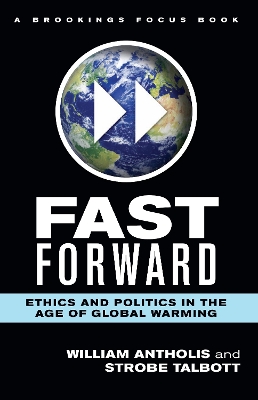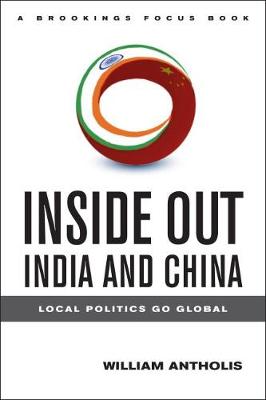Brookings Focus books
2 total works
Those of us alive today are the first generation to know that we live in the Age of Global Warming. We may also be the last generation to have any chance of doing something about it. Our forebears had the excuse of ignorance. Our descendants will have the excuse of helplessness. We have no excuse. -From Chapter One
Fast Forward is equal parts science primer, history lesson, policy prescription, and ethical treatise. This pithy and compelling book makes clear what we know and don't know about global warming; why the threat demands prudent and urgent action; why the transition to a low-carbon economy will be the most difficult political and economic transaction in history; and how it requires nothing less than a revolution in our sense of civic responsibility.
William Antholis and Strobe Talbott guide the reader through two decades of climate change diplomacy, explaining the national and international factors that have influenced and often impeded the negotiations. Their brisk narrative includes behind-the-scenes coverage of Barack Obama's impromptu meeting with key leaders in Copenhagen that broke a logjam and salvaged an agreement. The near-disaster of that summit demonstrated how the United Nations cannot move forward fast enough to produce a global deal. Instead, the "Big Four" of the United States, the European Union, China, and India must drive the next stage of the process.
Antholis and Talbott also recommend a new international mechanism modeled on the General Agreement on Tariffs and Trade that would monitor national commitments and create incentives for other countries to coordinate their efforts to cut emissions. Antholis and Talbott put their recommendations for immediate congressional and diplomatic action into the larger context of our obligation to future generations. They note that this theme is stressed by a diverse coalition of religious leaders who are calling for ambitious political action on climate change. The world we leave to our children and grandchildren is not an abstraction, or even just a legacy; we must think about what kind of world that will be in deciding how live -and act -today.
Fast Forward is equal parts science primer, history lesson, policy prescription, and ethical treatise. This pithy and compelling book makes clear what we know and don't know about global warming; why the threat demands prudent and urgent action; why the transition to a low-carbon economy will be the most difficult political and economic transaction in history; and how it requires nothing less than a revolution in our sense of civic responsibility.
William Antholis and Strobe Talbott guide the reader through two decades of climate change diplomacy, explaining the national and international factors that have influenced and often impeded the negotiations. Their brisk narrative includes behind-the-scenes coverage of Barack Obama's impromptu meeting with key leaders in Copenhagen that broke a logjam and salvaged an agreement. The near-disaster of that summit demonstrated how the United Nations cannot move forward fast enough to produce a global deal. Instead, the "Big Four" of the United States, the European Union, China, and India must drive the next stage of the process.
Antholis and Talbott also recommend a new international mechanism modeled on the General Agreement on Tariffs and Trade that would monitor national commitments and create incentives for other countries to coordinate their efforts to cut emissions. Antholis and Talbott put their recommendations for immediate congressional and diplomatic action into the larger context of our obligation to future generations. They note that this theme is stressed by a diverse coalition of religious leaders who are calling for ambitious political action on climate change. The world we leave to our children and grandchildren is not an abstraction, or even just a legacy; we must think about what kind of world that will be in deciding how live -and act -today.
For the last decade, China and India have grown at an amazing rate - particularly considering the greatest downturn in the U.S. and Europe since the Great Depression. As a result, both countries are forecast to have larger economies than the U.S. or EU in the years ahead. Still, in the last year, signs of a slowdown have hit these two giants. Which way will these giants go? And how will that affect the global economy? Any Western corporation, investor, or entrepreneur serious about competing internationally must understand what makes them tick. Unfortunately, many in the West still look at the two Asian giants as monoliths, closely controlled mainly by their national governments. Inside Out, India and China makes clear how and why this notion is outdated.
William Antholis - a former White House and State Department official, and the managing director at Brookings - spent five months in India and China, travelling to over 20 states and provinces in both countries. He explored the enormously diversity in business, governance, and culture of these nations, temporarily relocating his entire family to Asia. His travels, research, and interviews with key stakeholders make the unmistakable point that these nations are not the immobile, centrally directed economies and structures of the past. More and more, key policy decisions in India and China are formulated and implemented by local governments - states, provinces, and fast-growing cities. Both economies have promoted entrepreneurship, both by private sector and also local government officials. Some strategies work. Others are fatally flawed. Antholis's detailed narratives of local innovation in governance and business - as well as local failures - prove the point that simply maintaining a presence in Beijing and New Delhi - or even Shanghai and Mumbai - is not enough to ensure success in China or India, just as one cannot expect to succeed in America simply by setting up in Washington or New York. Each nation is as large, vibrant, innovative, diverse, and increasingly decentralized as are the United States, Europe and all of Latin America ... combined. China and India each have their own agricultural heartlands, high-tech corridors, resource-rich areas, and powerhouse manufacturing regions. They also have major economic, social, environmental challenges facing them. But few people outside these countries can name those places, or have a mental map of how the local parts of these countries are shaping their global futures. Organizations, businesses, and other governments that do not recognize and plan for this evolution may miss that the most important changes in these emerging giants are coming from the inside out.
William Antholis - a former White House and State Department official, and the managing director at Brookings - spent five months in India and China, travelling to over 20 states and provinces in both countries. He explored the enormously diversity in business, governance, and culture of these nations, temporarily relocating his entire family to Asia. His travels, research, and interviews with key stakeholders make the unmistakable point that these nations are not the immobile, centrally directed economies and structures of the past. More and more, key policy decisions in India and China are formulated and implemented by local governments - states, provinces, and fast-growing cities. Both economies have promoted entrepreneurship, both by private sector and also local government officials. Some strategies work. Others are fatally flawed. Antholis's detailed narratives of local innovation in governance and business - as well as local failures - prove the point that simply maintaining a presence in Beijing and New Delhi - or even Shanghai and Mumbai - is not enough to ensure success in China or India, just as one cannot expect to succeed in America simply by setting up in Washington or New York. Each nation is as large, vibrant, innovative, diverse, and increasingly decentralized as are the United States, Europe and all of Latin America ... combined. China and India each have their own agricultural heartlands, high-tech corridors, resource-rich areas, and powerhouse manufacturing regions. They also have major economic, social, environmental challenges facing them. But few people outside these countries can name those places, or have a mental map of how the local parts of these countries are shaping their global futures. Organizations, businesses, and other governments that do not recognize and plan for this evolution may miss that the most important changes in these emerging giants are coming from the inside out.

